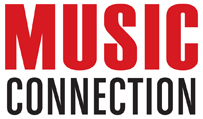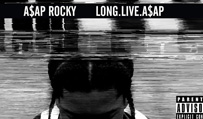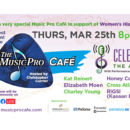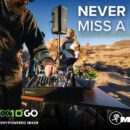The key to maintaining a career in music is diversification, and with this concept there are a lot of gray areas. Of course there are also some obvious ways to diversify as a musician, some of the most common being: teaching, playing weddings, writing for publications or blogs, composing library music, etc. However, in this brief article Michael NOMAD Ripoll offers 7 expert tips of diversification that take things a few steps further than the aforementioned standard ideas.
By Michael NOMAD Ripoll
1. Probably one of the most common outlets for musicians is teaching, but teaching in the manner of in-person private lessons is almost antiquated. With the burgeoning growth of online possibilities such as YouTube channels dedicated to tutorials, there are more ways to actually monetize the process of sharing knowledge or skills on your instrument with tools like ad revenue sharing. Companies actually pay small percentages of commissions for allowing them to post ads on your videos. Although it takes a large amount of views to add up, you’d be surprised at how nicely these little checks come in handy throughout the year.
2. Of course we’ve all played a wedding or two—or several hundred! When these opportunities come up, they’re actually a great way to earn some quick cash. But nowadays the talent pool is so deep and the actual demand for bands is becoming smaller as DJ’s comprise the larger market share. In the end, it can be tough to make ends meet by just playing private parties. Again, the Internet has busted open the former biz model with the ability to now host your own concerts and stream them online charging a nominal fee for cyber-tickets. Or even just requesting tips based on the audiences’ satisfaction can add up, especially if you’re crushing the virtual stage with your mad musical skills!
3. In a similar manner to streaming shows, personal house concerts have become popular among music lovers all across the globe. Here you’ll actually be able to implement a cover charge at the door, in addition to the possibility of passing the hat at the end of the evening. The bonus here is you actually get to interact with human beings, which is always nice in this day and age, plus think of the possibilities with selling band merch!
4. Composing underscore cues for music production libraries has been a staple of the industry for some time now, and while it has become quite saturated with competition and hence a surplus of content, reframe it like this—in your down time, you’ll just be sitting idle anyway, so why not keep those creative juices flowing by creating useful snippets of original music that just might end up earning you future royalties via licensing.
Read More: Music Industry Advice: Licensing for a Living
5. In many fields, consulting is considered a dirty word only because it can often be vague or convoluted as to what a consultant actually does. Consider for a moment all of the regular folks out there in the world who not only dream about having a career in music, but actually have the funds to back up those dreams. As a consultant you can act as an A&R rep, just like a record label would assign someone to an artist on their roster. You might help this person decide on their artistic direction by honing their sound into a marketable and commercially viable product. You might consult with them and their band of musicians on how to play their first big show.
Read More: Music Industry Advice: Rehearsal Insights from the Pros feat. Michael NOMAD Ripoll
Or perhaps you’ll act in the capacity of a performance coach, which walks them through the process of actually getting up on stage and acting on their dreams instead of just thinking about how great it would be. Finding it difficult to quantify how much to charge the client? Start with options such as an hourly rate versus a full project rate, or perhaps even a partial day rate or any combination thereof. Discuss it with the client to make sure you both agree on a number and a protocol that all parties are comfortable with.
6. Music workshops at local schools is a great community service in which you can network in circles you may not normally be exposed to. Many school districts set aside funding for events such as these focused learning mini-seminars to supplement the student-body’s normal curriculum. Speaking from firsthand experience, I’ve noticed that the faculty and students themselves are extremely grateful for these types of functions, and believe it or not word spreads pretty quickly among the community, which can of course result in more work referrals.
7. Thinking totally outside the box, you may want to consider providing live music accompaniment for Painting Parties. These are becoming more and more popular now, so why not offer your musical services to go along with the party. You can really help set the tone and mood of the room with the musical tastes that the host prefers. Not only will this add atmospheric enrichment to the event, but it might even inspire some attendees to paint something they may not have otherwise created.
I hope these ideas I’ve offered have inspired you to think of even more ways to diversify as an independent contracting musician to supplement your income and keep the lights on even in the slowest of seasons. I know for a fact if it weren’t for my willingness to think in broader terms such as these, the music just might stop playing and we all know that is something none of us could live with!
Michael NOMAD Ripoll has worked with Grammy-winning producers and artists on countless albums, TV/film scores, commercials and more. In addition, he is the author of The Career Guitarist, a clinician, educator, composer, producer, and music director for Kenny Babyface Edmonds. Visit NomadsPlace.com for more info, and use #AskNomad for any of your music related questions that might get answered on his blog NomadsPlace.tumblr.com.













